| Srl | Item |
| 1 |
ID:
112371
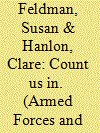

|
|
|
|
|
| Publication |
2012.
|
| Summary/Abstract |
This article reports the findings of a qualitative study that explores the linkages between female veterans' experiences in warlike, peacemaking, peacekeeping, and humanitarian operations and their perceived health support needs over the long term. It is based on the experiences of Australian female veterans who had deployed overseas. The findings suggest that a woman's emotional well-being over the long term and ability to fully reintegrate back into civilian life after deployment is diminished when there is a significant disparity between her expectations of deployment and her actual operational experiences. A major implication from these findings is that civilian health and support services should develop a better understanding of the distinctive needs of the female veteran population and develop stronger linkages with the military community so as to facilitate ongoing deployment-related support for female veterans.
|
|
|
|
|
|
|
|
|
|
|
|
|
|
|
|
| 2 |
ID:
173920
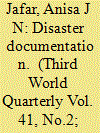

|
|
|
|
|
| Summary/Abstract |
This study investigates clinical practitioners’ use of medical documentation during sudden-onset disasters in order to better understand how we can improve practice. Thirteen participants, representing nine nationalities and six clinical disciplines (with the collective working experience of at least 15 different organisations providing disaster response), underwent semi-structured interviews using an inductive approach based in grounded theory. The initial codes and themes were analysed over four coding rounds and developed into selective codes. The findings suggest that documentation is overwhelmingly de-prioritised in disasters due to competing demands; there is little incentive to complete documentation at an organisational or government level; practitioners acknowledge the importance of and need for adequate documentation; paper documentation still has its place whilst electronic approaches have both benefits and drawbacks; and disasters require bespoke documentation solutions. Development of the emergency medical team (EMT) ‘data management’ role within EMTs may be one way to focus teams on key areas of improvement.
|
|
|
|
|
|
|
|
|
|
|
|
|
|
|
|
| 3 |
ID:
157107
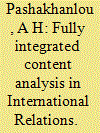

|
|
|
|
|
| Summary/Abstract |
Content analysis has once again come to the forefront of discussions regarding methods in International Relations (IR). The first wave of content analysis in IR lasted from the 1940s to the 1960s and was marked by a commitment to quantitative and manual analyses. The second wave of content analysis appeared at the start of the third millennium and continues to pervade the discipline. As with the first wave, it proceeds in a predominantly quantitative manner but emphasizes computer-assisted analysis rather than manual analysis. Critics and advocates of the method alike have, highlighted numerous shortcomings with these approaches. In order to address these limitations, the present investigation argues for a fully integrated content analysis that has the potential to ameliorate the identified weaknesses that have hitherto plagued the method. It accomplishes this task by combining all facets of the method: quantitative, qualitative, manual, and computer-assisted content analyses within a single research project.
|
|
|
|
|
|
|
|
|
|
|
|
|
|
|
|
| 4 |
ID:
128948
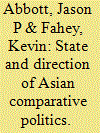

|
|
|
|
|
| Publication |
2014.
|
| Summary/Abstract |
In this article we explore the state of the discipline of comparative Asian politics. In particular we analyze five aspects of research on Asia: whether the empirical scope of research is largely noncomparative; the extent to which that research is empirical rather than theory-generative; whether it pertains to public or foreign policy; if it relies on qualitative rather than quantitative methods; and the gender and geographic concentration of those conducting the research. After coding and analyzing data from 461 articles from eight different journals, we demonstrate that research on comparative Asian politics is more likely to be empirical, qualitative, focused on the country as unit of analysis, and disproportionately written by male academics educated and/or working in North America, Western Europe, or Australia.
|
|
|
|
|
|
|
|
|
|
|
|
|
|
|
|
| 5 |
ID:
182698
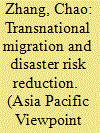

|
|
|
|
|
| Summary/Abstract |
Migrants can be disproportionately impacted by disasters due to their increased vulnerability. Knowledge of Chinese migrants' perceptions and experiences in the face of hazards and disasters is limited. This qualitative descriptive study explored Chinese migration in relation to disasters and disaster risk reduction in New Zealand. Semi-structured interviews with 22 Chinese migrants living in Auckland were conducted and data were thematically analysed. Participants displayed strong transnationalism via the creation of ‘mini-China’ and conceptions of China as their ‘mother’ country and New Zealand their ‘step-mother’ country. Chinese migrants compared their experiences of disasters in China to those in New Zealand, with many expressing difficulties with accessing information and not trusting New Zealand government authorities, particularly given how the approach contrasts to China's more ‘hands on’ approach. Fear of losing life and property and responsibility to their family were key factors underpinning Chinese migrants' decision to prepare for a disaster. Participants shared insights to guide disaster risk reduction efforts from a community level and expressed a willingness to participate in disaster preparedness organised by agencies involved in disaster risk reduction. The findings indicate capacities of Chinese migrants that planners can leverage and highlight important cultural nuances that need attention in future planning.
|
|
|
|
|
|
|
|
|
|
|
|
|
|
|
|